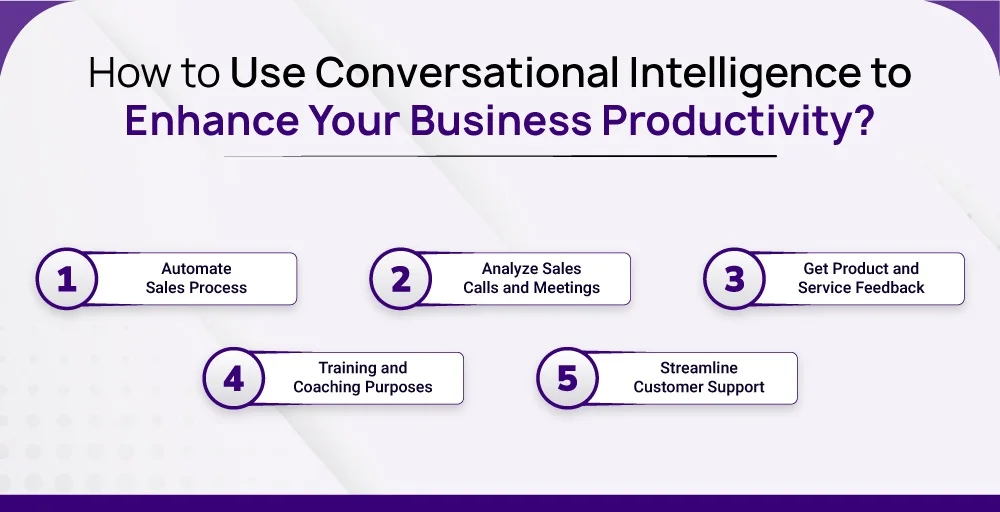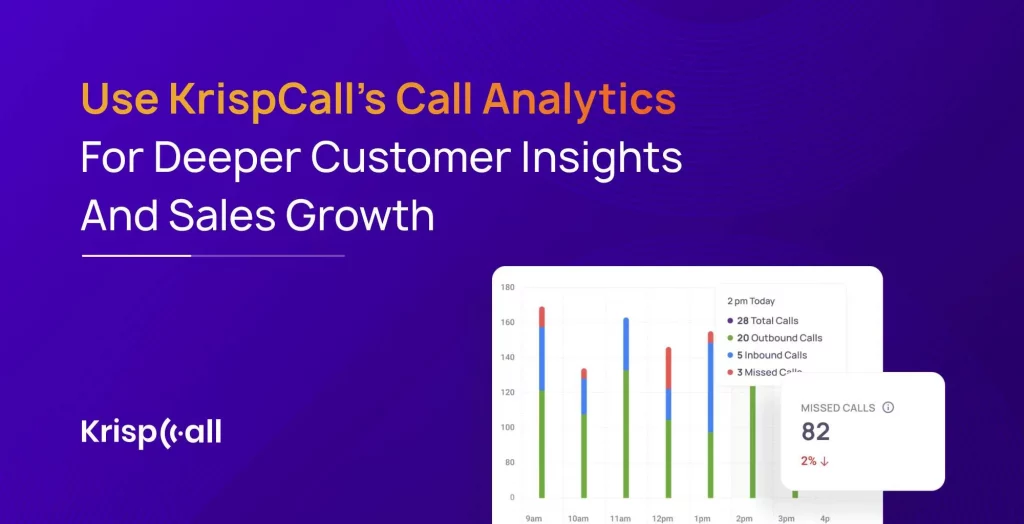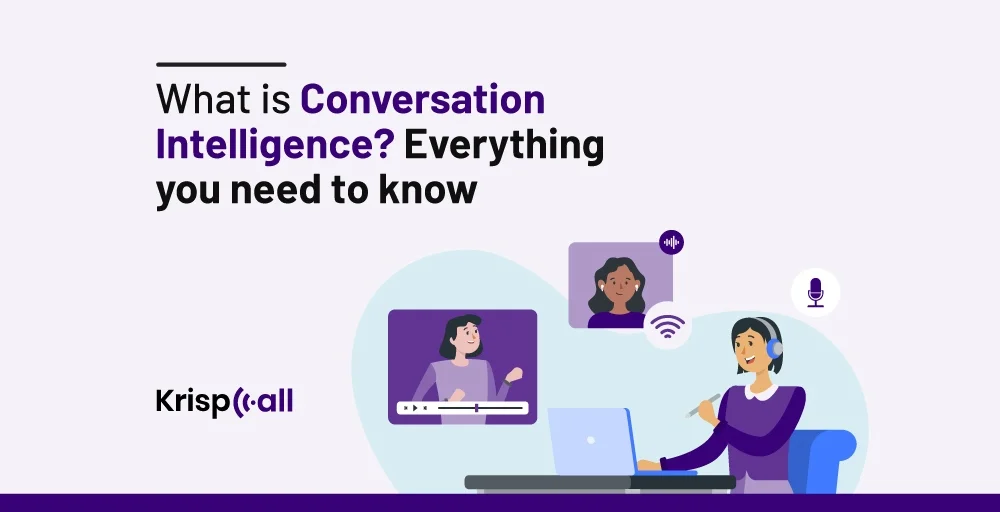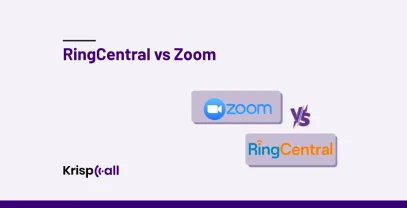The insights that are embedded in any or all interactions that your business personnel engage in can be categorized as a hidden goldmine that is just waiting to be discovered.
That is true as that statement was reflected as a fact in a report by Gartner which said 84% of customer service leaders believe customer data and analytics are important to achieve organizational objectives.
That said, whether your business is currently focusing on sales, marketing, or customer service. The driving factor that accelerates the growth and upbringing of all of those can be ‘Conversation Intelligence’, which can also act as ‘The Key’ to understanding your audience on a deeper level.
So, let’s get going with this one-stop guide to conversation intelligence, where you’ll learn the basics of conversation intelligence, explore how it works, why it is important to be used, how it can be used to transform your business, and more.
Let’s dive in! 👇
🔑KEY HIGHLIGHTS
- Conversation Intelligence is the use of AI to get insights into spoken or written interactions.
- You should look for features like real-time sentiment analysis, built-in analytics & data mining, and call recording & transcription when choosing a Conversation Intelligence software.
- By using conversation intelligence, you should look to automate the sales calling process, get product & service feedback, and streamline customer support.
- KrispCall’s call analytics feature is the best option for direct insights into key call metrics that can drive sales growth.
What is Conversation Intelligence?
Conversation Intelligence is basically the use of AI to understand and/or get insights into spoken or written interactions. It is done so as to understand what is being said, why, and the meaning behind it.

It is done by utilizing machine learning, natural language processing (NLP), and human input to extract structured data from unstructured conversational data. Businesses often use conversation intelligence to improve customer experiences and drive performance & better results by understanding customer mindsets and emotions.
That said, conversation intelligence software in the context of customer experience can analyze the following:
- The actual words spoken in a call and then provide the transcription of it.
- Content from chat conversations or social media interactions.
- The emotional tone of the customer’s conversation (positive, negative, neutral).
- The main subjects/themes/keywords discussed in the conversation.
- Analyze things mentioned in the conversation, such as specific people, places, or things.
- Also, suggestions for actions.
For example, an agent is dealing with a customer, and they are frustrated. Here, a typical conversation intelligence software can analyze the call, identifying common pain points and suggesting solutions. After that, it can provide insights telling that the caller is struggling with a specific feature. Then the software can then provide the agent with clear explanations and troubleshooting tips, leading to faster resolutions and happier customers.
How Does Conversation Intelligence Work?
In short, conversation intelligence is a tool that uses a combination of natural language processing (NLP), machine learning (ML), artificial intelligence (AI), and human feedback. And it works by leveraging all of those to analyze vast amounts of fed conversation data and then extract & present valuable insights obtained.
In any case, there’s a long list of underlying steps involved in making it even actually work. Also, just to give you an idea of what they are. Here they are.
Step 1: First, conversation intelligence software collects data, which means recording all conversations across various channels like phone calls, video meetings, chats, emails, and even social media interactions.
Step 2: In the next step, the recorded interactions are transcribed into text format using speech recognition technology. This allows the software to analyze the content more easily.
Step 3: Here, NLP comes into play here. All of the NLP techniques are used and implemented to understand the meaning behind the words. In this step, the identification of keywords, topics, sentiment (positive, negative, neutral), and even speaker information is done.
Step 4: Next, advanced AI algorithms are used to transcribe the text and extract information for analysis. Again, this analysis can uncover patterns, trends, and key points in the conversations.
Step 5: In the final step, conversation intelligence software presents all of the condensed analysis in a user-friendly format, providing actionable insights: this information can be used to improve customer service, sales techniques, product development, and overall business strategy.
What Are The Features To Look For In Conversation Intelligence Software?
The capabilities and outcomes that conversation intelligence software presents are immense. Nonetheless, the actual results a conversation intelligence tool can bring forth directly depend on the features & functionalities it actually has.
Thus, when choosing a tool like that, it takes a thorough consideration of such factors. And to help you with that, here’s what you need to look for:
- Call Recording & Transcription: It is a must for conversation intelligence software to have these two features; otherwise, it cannot even be considered a decent one. So, choose a software that can reliably record and transcribe calls across channels.
- Real-Time Sentiment Analysis: The software you chose should also accurately identify the emotions and tone of the conversation. It should also help understand customer/rep sentiment and pinpoint crucial aspects of the interaction.
- Actionable Insights and Coaching: Another factor to look for is the software’s capabilities to provide actionable insights based on the analysis. This may include features such as coaching tools that help improve rep performance.
- Built-in Analytics and Data Mining: As a matter of fact, software like this must have these capabilities. That is due to, given the nature of gaining proper insights into conversation, it is often not so easy.
Why Is Conversational Intelligence Important?
In the context of interactions with customers, having intelligently curated insights during the conversation itself can prove to be a significant perk. That, naturally, is for the purpose of delivering a better customer experience. So, let’s look at the factors that determine the importance of conversation intelligence.
It offers valuable insight for making a data-driven decision.
Using conversation intelligence, businesses, especially call centers, can make data-driven decisions. That’s certainly true, as a tool like this provides accurate and real insights gleaned from customer conversations.
It, by its presence, helps make informed decisions about everything related to customer service strategies. That means no more guesswork, just concrete information to guide your actions.
It provides better and more authentic interactions than chatbots.
The influence of conversation intelligence software is not only limited to gaining insights into interactions. It can help analyze real conversations and in real time.
What’s more, this allows businesses to understand customer needs and preferences better, leading to more authentic and personalized interactions, which is just the opposite of chatbots that give scripted responses.
It improves sales performance and conversion.
In terms of contributing to sales performance and conversion, conversation intelligence tools are also of significant importance. It can help by analyzing successful sales calls, pinpointing winning sales techniques, how they were carried out, and common customer objections that often come from those.
These insights can potentially equip sales reps with valuable knowledge that they should always have to close more deals, improve conversion rates, and reduce customer churn.
It enhances agent productivity.
A good conversation intelligence software can often do the grunt work and automatically carry out tasks like call transcription and summarizing key points that were discussed in the conversation.
And what it does is this frees up agents’ time and gives them enough time to focus on higher-value activities like resolving complex customer issues, which eventually results in better productivity. Additionally, with the insights it provides also enables reps to understand customer needs better, provide tailored solutions, and improve overall productivity.
It boosts customer satisfaction.
Through the use of a conversation intelligence platform, businesses can enhance the quality of customer interactions. Most certainly, it can be used to understand sentiments, address concerns effectively, and personalize experiences based on analyzed data.
This personalized approach leads to increased customer satisfaction and loyalty, improved overall brand reputation, and the end result of happier customers and, potentially, positive word-of-mouth promotion.
Who Uses Conversation Intelligence Tools?
While there’s a wide variety of use cases and perceptions of who really uses a conversation intelligence platform, not to mention the fact that it’s not so easy to give the exact explanation of who uses those, so, just to give you some context about that, we’ve outlined ‘who uses’ here:
- Sales and Marketing Teams: Teams of this sort often use a conversation intelligence platform for sales calls analysis and identify what winning strategies were used in their success. They also use it to understand common customer objections and personalize their campaigns for better results.
- Customer Support Teams: Conversation intelligence tools, with their native functionality, can accurately pinpoint customer frustration or pain. So, for that, support teams use those insights to tone their strategy for better service delivery.
- E-commerce businesses: E-commerce businesses often use these platforms to analyze customer conversations across various channels like calls, chats, and emails. This might include identifying customer preferences and optimizing their sales planning methods for individual customers.
- Operations Teams: The use of conversation intelligence tools is not limited to understanding customer sentiment. These systems can and are used by operational teams to streamline processes and optimize operational efficiency based on insights derived from conversations that were done within the workplace.
- Research and Development Teams: Finally, research & development teams also use conversation intelligence platforms to gain insights into customer feedback that were based on product experience or just extract market trends from conversations all around.
How to Use Conversational Intelligence to Enhance Your Business Productivity?

Conversational Intelligence can, obviously, be used by any or all teams that work together to make up a successful business. That said, the true proficient result that teams can have by using these depends on how they use it.
Therefore, in order to achieve that said result, here’s how you should use a conversational intelligence tool to enhance your business’s productivity:
Automate Sales Process
As the first thing, you can use these applications to automate certain aspects of your sales process. What you use it for actually depends on you; these can be used to automate mundane tasks like call recording, call transcription, or summarize the key points discussed in the conversation.
In short, what it does is that it frees up valuable time for sales reps to focus on building relationships with potential customers and closing deals.
Analyze Sales Calls and Meetings
You can also use conversation intelligence to identify the points or areas where your sales pitches fall short. And how can that be done? Well, it’s easy; all you have to do is make full use of the sentiment analysis feature that comes loaded into it together with sales call analytics.
Using it, you can understand what the customer is trying to convey through emotions and, based on that, change your approach.
Get Product and Service Feedback
The truth is that the true capabilities of conversation intelligence programs are directly dependent on the users and how they use them. And while there are many ways to use those, a conversation intelligence system can also be used in product and service feedback done by customers.
One way to do this is to employ these in automated surveys to proactively gather insights on user experiences, preferences, and pain points.
Training and Coaching Purposes
As of now, it is clear that Conversational Intelligence software can and does provide direct insights into spoken or written interactions, therefore understanding what is said, why, and what the words mean. All of that is done in an easy-to-understand manner.
With that, what you can do is use that to identify both strengths and areas that need improvement in their team members’ communication skills. Additionally, with the right examples in hand, you set up personalized coaching programs based on individual performance metrics and foster continuous development.
Streamline Customer Support
As a final thing, you should always remember that conversational intelligence tools play a crucial role in streamlining customer support processes. The reason for this is that these platforms, by definition, can interpret conversations in contact centers or support interactions (of all types).
As mentioned many times earlier, these analyses can help identify common issues or guide support teams in resolving problems effectively. Additionally, certain conversation intelligence programs can help significantly improve customer satisfaction. As with these, you’ve got almost everything as a ‘pre-set’ (conversation analysis) that can be used to assist new team members during training.
Conversation Intelligence Software vs. Call-Tracking Software. What is the difference?
Though both conversation intelligence and call-tracking software theoretically almost do the same thing, i.e., monitor interactions. The real difference is that call tracking is only applicable for calls, and on the other side, conversation intelligence is a much broader concept and is used to get deeper insights, sentiment analysis, and data extraction from conversations.
Here is a comparison table for the two:
| Conversation Intelligence Software | Call-Tracking Software |
| Analyzes the content of calls | Tracks call metrics |
| Uses AI to identify keywords, sentiment, and topics | Provides data on call volume, duration, source, and outcome |
| Helps improve customer experience, sales techniques, and agent coaching | Helps identify marketing campaign effectiveness and track lead generation |
| Improved customer satisfaction, increased sales, better agent performance | Better marketing ROI, optimized lead nurturing, and campaign attribution |
Use KrispCall’s Call Analytics For Deeper Customer Insights And Sales Growth
Struggling to extract actionable insights from your sales calls?
Look no further, as KrispCall’s got your back with its powerful call analytics feature. This feature is loaded with advanced capabilities that can provide you with a comprehensive view of all essential call metrics like call volume, duration, and missed calls.

This feature makes it easier for businesses to gain insights into their call center operations related to calls, how the agents are performing, and also how customers are engaging with them.
Moreover, it also paves the way for strategic sales growth by helping you identify the things that are actually producing results and also areas that need to be worked on to drive your business’s sales growth.
Drive sales and customer engagement to better results with KrispCall’s call analytics – the key to unlocking a deeper understanding of your customer calls. So, see for yourself how KrispCall can transform your sales conversations. Try KrispCall today!
The Wrap-up!
To sum things up, currently, conversation intelligence isn’t just a system that helps businesses gain insights into interaction; it is quickly on the way to becoming one of the many necessities that modern enterprises need.
That said, just by embracing it, harnessing its functionalities, and properly making use of it, companies can surely understand their customer’s sentiments, keep up with the trends of everchanging customer needs, and most importantly, make the right decisions with the insights in hand.
One last thing: if you are looking to get a quick analysis and wish to track key metrics related to calls handled by your customer service. There is no better option than opting for KrispCall’s cloud telephony service, which has a call analytics feature that can provide you with just everything you need!
FAQs
What is conversation intelligence for customer service?
Conversation intelligence for customer service is the use of artificial intelligence and machine learning to extract valuable insights from the interactions that support agents have had or will have with the customers.
It involves gleaning things like emotions, effort, and intent, as well as trends that were followed in the conversation. And it is valid for conversations that are conducted on calls, chats, emails, social media, and many more.
What is the difference between Conversational Artificial Intelligence and Conversation Intelligence?
The main difference between conversational AI and conversation intelligence can be found in their functions: conversational AI means having conversations with AI systems like chatbots and virtual assistance, and conversation intelligence means analyzing conversations to extract insights through AI.
How can managers use conversation intelligence?
Managers can use conversation intelligence in the following ways:
- To better understand their customers and their needs.
- Use insights to deliver a better customer experience and reduce customer churn.
- Automate analysis and use it for better decision-making.
- Understand the strengths and weaknesses in the communication styles of all their teams.





